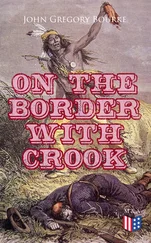John Lang - Stories of the Border Marches
Здесь есть возможность читать онлайн «John Lang - Stories of the Border Marches» — ознакомительный отрывок электронной книги совершенно бесплатно, а после прочтения отрывка купить полную версию. В некоторых случаях можно слушать аудио, скачать через торрент в формате fb2 и присутствует краткое содержание. Жанр: literature_19, foreign_antique, foreign_prose, на английском языке. Описание произведения, (предисловие) а так же отзывы посетителей доступны на портале библиотеки ЛибКат.
- Название:Stories of the Border Marches
- Автор:
- Жанр:
- Год:неизвестен
- ISBN:нет данных
- Рейтинг книги:5 / 5. Голосов: 1
-
Избранное:Добавить в избранное
- Отзывы:
-
Ваша оценка:
- 100
- 1
- 2
- 3
- 4
- 5
Stories of the Border Marches: краткое содержание, описание и аннотация
Предлагаем к чтению аннотацию, описание, краткое содержание или предисловие (зависит от того, что написал сам автор книги «Stories of the Border Marches»). Если вы не нашли необходимую информацию о книге — напишите в комментариях, мы постараемся отыскать её.
Stories of the Border Marches — читать онлайн ознакомительный отрывок
Ниже представлен текст книги, разбитый по страницам. Система сохранения места последней прочитанной страницы, позволяет с удобством читать онлайн бесплатно книгу «Stories of the Border Marches», без необходимости каждый раз заново искать на чём Вы остановились. Поставьте закладку, и сможете в любой момент перейти на страницу, на которой закончили чтение.
Интервал:
Закладка:
Grisell Home was Lady Grisell Baillie when, in 1703, her mother died.
"Where is Grisell," she asked, almost with her latest breath. And when Lady Grisell came and held her hand the old lady said, "My dear Grisell, blessed be you above all, for a helpful child you have been to me."
Lady Grisell Baillie lived through the '15 and the '45, and those who suffered in the first of those years had the kindest of friends and helpers in her large-minded husband and in herself. She was eighty at the time of the '45, but during that year and during the next, when her death took place, she helped by every means in her power those who had suffered from fighting for a cause that was dear to their hearts. She always remembered what she herself had gone through. "Full of years, and of good works," as her somewhat pompous epitaph has it, Lady Grisell Baillie died in December 1746, and was buried at Mellerstain on the day upon which she should have celebrated her eighty-second birthday. And surely the angels who, on that first Christmas Eve, long, long ago, sang of "Peace on earth – goodwill towards men," must have been very near when she, who was a Christmas baby, and whose whole long life had been one of love and of peace, of goodwill and of charity to others, was laid in the earth as the snowflakes fell, on Christmas Day, one hundred and sixty-eight years ago.
KINMONT WILLIE
A venerable and highly respected Scottish professor of literature was once asked what was his ruling passion – his heart's desire? If the secrets of his soul could be laid bare, what, above all, would be found to be his predominant wish? The question was an indiscreet one, but he was tolerant. He tightly compressed his gentle mouth, and firmly readjusted his gold-rimmed glasses.
"I wish " said he, "to be a corsair."
It would have been interesting to know how many of a following he would have had from sedate academic circles had he been given his heart's desire and had sailed down the Clyde with the raw head and bloody bones showing on the black flag that flew at his mast-head. How many of us are there with whom law-abiding habits, decorous respectability, form but a thin covering of ice over unplumbed depths of lawless desire? Not long since, when a wretched criminal case in which the disappearance of a pearl necklace was involved, was agitating every Scottish club and tea-table, a charming old Scottish lady, whose career from childhood up has been one of unblemished virtue, was heard to bemoan the manner of commission of the crime. "She did it very stupidly. Now, if I had been doing it I should" – And her astounded auditors listened to an able exposition of the way in which she would successfully have eluded justice. Is it the story of the villain who is successfully tracked to his doom that attracts us most? or that of the great Raffles and his kind whose villainies almost invariably escape detection, and who burgles with a light and easy touch and the grace and humour of a Claude Duval? Let us be honest with ourselves. How many of us really wish to be corsairs? Which of us would not have been a reiver in the old reiving days? Have we not noticed in ourselves and other Borderers an undeniable complacency, a boastful pride in a mask of apology that would not deceive an infant, when we say, "Oh yes; certainly a good many of my ancestors were hanged for lifting cattle." And, however "indifferent honest" we ourselves may be, which of us does not lay aside even that most futile mask and boast unashamedly when we can claim descent from one of those princes among reivers – Wat o' Harden, Johnnie Armstrong, or Kinmont Willie?
William Armstrong, better known as Kinmont Willie, lived in the palmiest days of the Border reivers. The times of purely Scottish and purely English kings were drawing to a close, and with one monarch to rule over Britain the raider could no longer plead that he was a patriot who fought for king and country when he made an incursion over the Cheviots, burned a few barns and dwelling-houses, lifted some "kye and oxen," horses, and goats, and what household gear and minted money he could lay hands on, slew a man or two, and joyously returned home.
But with Elizabeth still on the English throne, and with Queen Mary, and afterwards her son, reigning in Scotland, the dance could go merrily on, and when we look at those days in retrospect it seems to us that the last bars of the music, the last turns in the dance, went more rapidly than any that had gone before.
In Kinmont Willie's lifetime the Wardens of the Marches had but little leisure. It was necessary for them to be fighting men with a good head for figures, for on the days of truce when the Wardens of the Scottish and English Marches met to redd up accounts, not only had they to work out knotty arithmetical problems with regard to the value of every sort of live stock, of buildings, of "insight," and the payment of such bills, but they had to have expert knowledge in fair exchange of a Scottish for an English life, an English for a Scotch. Little wonder if their patience sometimes ran short, as did that of a Howard of Naworth upon one famous occasion. He was deeply engrossed in studies that had no bearing upon Border affairs when an officer came to announce the capture of some Scottish moss-troopers, and to ask for the Warden's commands with regard to them. The interruption was untimely, and Lord Howard was exasperated. "Hang them, in the devil's name!" he said angrily, and went on with his studies. A little later he felt he could better give his mind to the consideration of the case, and sent for his officer. "Touching the prisoners," said he, "what have you done with them?"
Proud of being one of those who did not let the grass grow beneath their feet, the officer beamingly responded: "Everyone o' them's hangit, my lord!"
It was a March day in 1596, when a Wardens' meeting took place at Dayholm, near Kershopefoot. The snow was still lying in the hollows of the Cheviots, the trees were bare, the Liddel and the Esk swollen by thaws and winter rains; but weather was a thing that came but little into the reckoning of the men of the Marches unless some foray was afoot. They got through the business more or less satisfactorily, and proceeded to ride home before the day of truce should be ended. From sunrise on the one day until sunset on the next, so the Border law ordained, all Scots and Englishmen who were present at the Wardens' meeting should be free of scathe. Now the Warden of Liddesdale at that time was Sir Walter Scott of Branxholme, laird of Buccleuch. He was one of the greatest men of his century; a "fyrebrande," according to Queen Elizabeth, and a fierce enemy according to those who incurred his enmity; but, according to all others, a man of perfect courage, stainless loyalty and honour, charming wit, and great culture. He never spared an enemy nor turned his back on a friend, and he was a born winner of hearts and leader of men. Amongst his retainers was Kinmont Willie, and as Willie rode from the Wardens' meeting, along the banks of the Liddel, in company with only three or four men, a body of two hundred English horsemen, commanded by Salkeld, Warden of the Eastern March, marked him from across the water. Truce or no truce, the chance seemed to them one that was too good to lose. Speedily some of them pushed on ahead, and an ambush was laid for Kinmont Willie. He and his friends were naturally totally unprepared for such a dastardly attack, but it took them but little time to gather their wits, and Willie gave them a good run for their money. For nearly four miles they chased him, but ran him down at length. After some hard giving and taking, he had to acknowledge his defeat, and, pinioned like a common malefactor – arms tied behind him, legs bound under his horse's belly – they rode with him into Carlisle town.
Читать дальшеИнтервал:
Закладка:
Похожие книги на «Stories of the Border Marches»
Представляем Вашему вниманию похожие книги на «Stories of the Border Marches» списком для выбора. Мы отобрали схожую по названию и смыслу литературу в надежде предоставить читателям больше вариантов отыскать новые, интересные, ещё непрочитанные произведения.
Обсуждение, отзывы о книге «Stories of the Border Marches» и просто собственные мнения читателей. Оставьте ваши комментарии, напишите, что Вы думаете о произведении, его смысле или главных героях. Укажите что конкретно понравилось, а что нет, и почему Вы так считаете.












